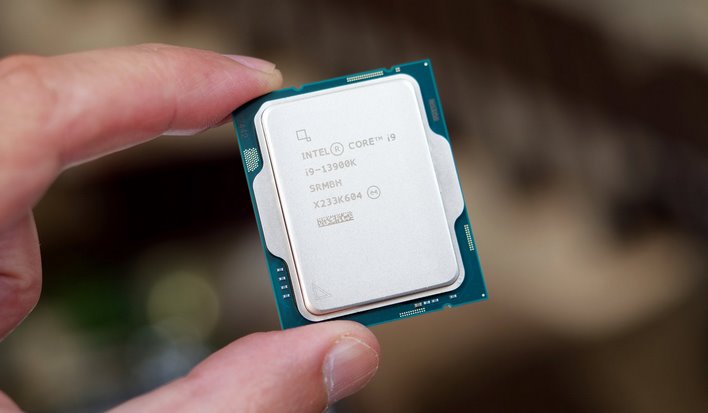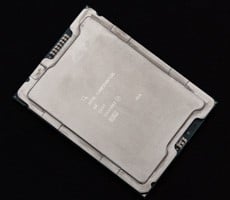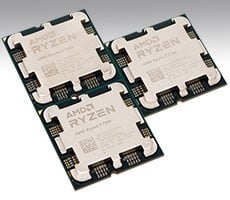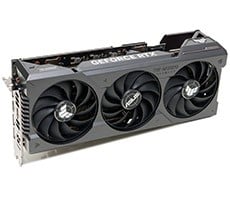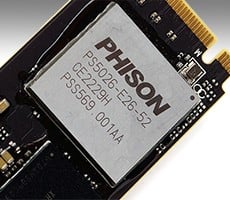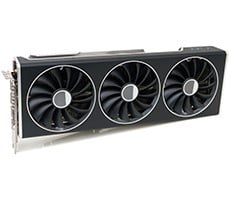Intel Core i9-13900K & Core i5-13600K Review: Raptor Lake Roars
Overclocking The Intel Core i9-13900K
Armed with the latest version of Intel's Extreme Tuning Utility, we first tried to use the built-in "one click" Speed Optimizer to see if it could wring some additional performance out of our setup, but scores in a handful of benchmarks were mostly unchanged.Without any manual overclocking, but with the power level maxed via the motherboard's BIOS, the Core i9-13900K's temps would quickly ramp up into the mid-90°C range and would thermally throttle under long sustained workloads, where the chip would heat up to 98°C. Our setup was effectively behaving like AMD's Ryzen 7000 series chips, which are designed to use every bit of thermal headroom available at a given time. If configured with a 253W max power level, the voltage and frequency curve isn't as aggressive, so power and thermals are much more manageable, but performance is reduced quite a bit.
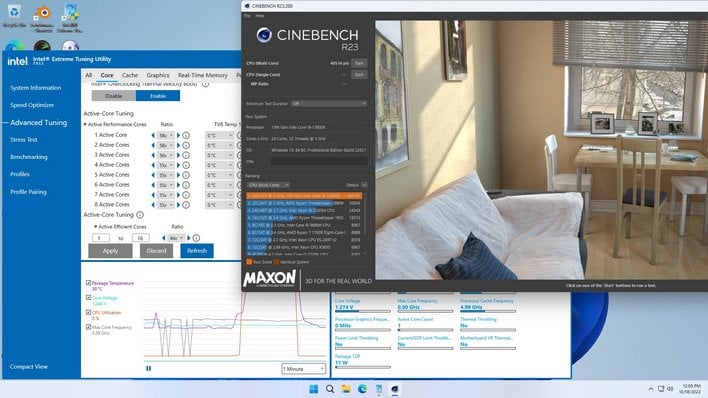
Intel Core i9-13900K Undervolted + Overclocked
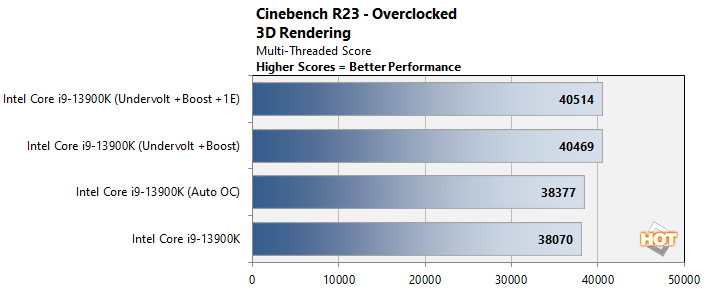
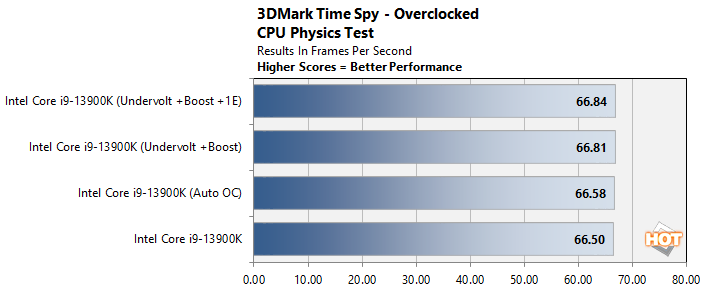
While we had the system tweaked, we re-ran a couple of tests with mixed results. Cinbench ultimately showed about a 6.5% performance increase, easily surpassing the 40K mark, but 3DMark's Physics test showed only a slight improvement. In this configuration, peak frequencies with single or multi-threaded workloads that utilize every core / thread are unchanged, but there's more power / thermal headroom available and threaded workloads that don't whack every core simultaneously receive a boost.
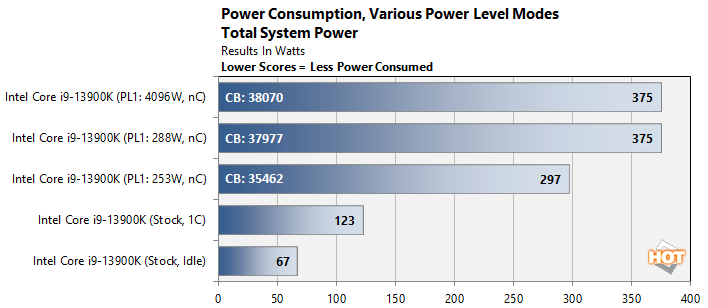
If you don't plan to do any overclocking, any decent, modern cooler will due just fine with the Core i9-13900K. When configured with its default 253W max power level, total power consumption is reduced significantly. The delta was nearly 80 watts when running Cinebench in our tests, despite the next higher setting technically increasing the limit by "only" 35 watts. In fact, with our setup, the 288W and 4,096W options resulted in similar power consumption and performance.
All of that said, your mileage will vary. But if you do plan to grab a high-end 13th Gen processor like the Core i9-13900K, factor a high-performance 280mm - 360mm AIO cooler into the equation. You'll need maximum cooling performance to wring the most from this fierce Raptor Lake chip.
Intel 13th Gen Core Raptor Lake - The Verdict
AMD's recently-released Ryzen 7000 series processors showed some major gains over the previous-gen 5000 series, besting their predecessors virtually across the board. Although these Raptor Lake-S based 13th Gen Core processors don't leverage a totally new architecture, the tweaks Intel made lifted performance significantly in both single and multi-threaded workloads. With more cores, more cache, and higher-frequencies, the Core i9-13900K was significantly faster than the Core i9-12900K and it outpaced the Ryzen 9 7950X in the vast majority of our tests. It was only in 7-zip and a couple of multi-threaded rendering tests where the 7950X pulled ahead. Overall, it is fair to say the Core i9-13900K is generally faster than the Ryzen 9 7950X.The Core i5-13600K also performed very well throughout our testing. With a few exceptions, the Core i5-13600K typically trailed the previous flagship Core i9-12900K by few percentage points, but outran the higher-priced Ryzen 7 7700X.
Looking back through all of the data, Intel's new 13th Gen Core processors typically offer better single and multi-threaded performance than the Ryzen 7000 series, at least at the two price points occupied by the Core i9-13900K and Core i5-13600K. And these two processors are also priced lower than rival AMD's parts. The Core i9-13900K arrives at $589, whereas the Ryzen 9 7950X is $699. The Core i5-13600K has an MSRP of $309, which is closer to the $299 Ryzen 5 7600X, despite outperforming the $399 Ryzen 7 7700X. Although there are exceptions, generally speaking, these Intel 13th Gen processors offer more performance than competitive Ryzen 7000 series processors, and at lower price points. That is, assuming street prices approach MSRP. Intel's Core i9-12900K is under $500 now, but was selling above MSRP for quite some time. And we're not factoring in motherboard and memory pricing here of course.
AMD does clearly have an advantage in terms of power consumption, however. Although Intel claimed significant power and efficiency advantages with Raptor Lake, these enthusiast-class processors consume significantly more power under load than the 12th Gen chips they supplant in Intel's line-up. We don't think that's a major issue for most enthusiasts, but it is still nonetheless something to consider.
The main takeaway for us today is that competition is fierce in the desktop CPU space with this round. Less than a year after Alder Lake's arrival, Intel is at it again, with a new series of processors that clearly outmatch their predecessors and bring the fight to AMD on multiple fronts. We look forward to seeing how things shake out once availability ramps and street prices settle down. We suspect there's going to be some jockeying and repositioning going on over the next few months, which usually means good things for consumers.


